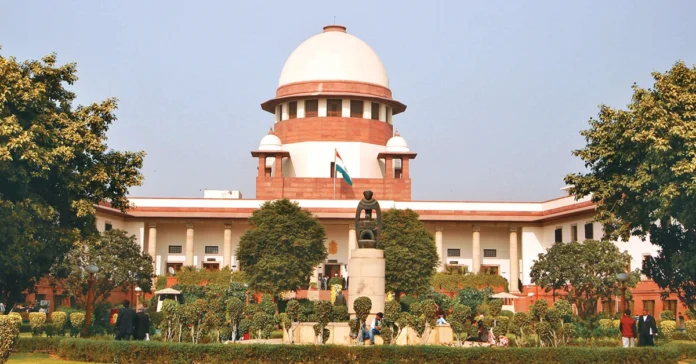Viduthalai Chiruthaigal Katchi, the largest Dalit party in Tamil Nadu, has filed a petition in the Supreme Court seeking review of its August 1 verdict related to the power of the states on sub-classification of castes in the country.
The present petition has been filed by Thol Thirumavalavan, Member of Parliament and President of Viduthalai Chiruthaigal Katchi.
On August 1 this year, a seven-judge bench of the Supreme Court held by a 6-1 majority that sub-classification of Scheduled Castes was permissible to grant separate quotas for more backwards within the Scheduled Castes category.
The order was passed by the Bench of Chief Justice of India DY Chandrachud, Justice BR Gavai, Justice Vikram Nath, Justice Bela M Trivedi, Justice Pankaj Mithal, Justice Manoj Misra and Justice Satish Chandra Sharma.
The Bench overruled it’s earlier judgement in E.V. Chinnaiah v. State of Andhra Pradesh of 2005, which held that the State cannot apportion reservations among subclasses within the Scheduled Castes’ list.
The seven-judge Bench ruled that the sub-classification of the Scheduled Castes for the reservation is permissible.
Earlier, a review petition was filed by lawyer Jaishri Patil, contending that the Supreme Court’s interpretation in the Indra Sawhney case (1992) regarding the sub-classification of backward classes did not apply to SCs and STs.
The review petition stated several grave and manifest errors of law in the impugned judgment, seeking correction of the same.
It said the August 1 verdict of the Apex Court made an error by failing to establish an upper limit on the number of seats that can be reserved for the more backward castes within the overall Scheduled Castes quota.
The Court failed to observe that upper limit must be proportionate to the percentage of the population of the identified sub-class and such a limit ought to be prescribed by this Court to prevent the exclusion of other castes falling in the list of Scheduled Castes.
The judgment was contrary to the well-settled legal principles of ‘reasonable classification’ under Article 14 of the Constitution as it failed to assess the limitations of subclassification of the list of Scheduled Castes.
The petition said the Apex Court noted in its verdict that there were two models of reservations for the sub-classified classes, the preference model and the exclusive model.
It said the CJI recognised at para. 179 that “it needs to be analyzed if both models are constitutional” but erred in properly examining the constitutional limits of the two models.
The judgment correctly reasoned in para. 182 (CJI) that the constitutionality of the preference model or the exclusive model would depend on whether the variation in-effect excludes any caste notified as a Scheduled Caste with respect to that State by the President under Article 341(1), however, it failed to note that when a certain caste or castes were allocated a disproportionate percentage of seats or disproportionate sub-quota vis-a-vis their population, it effectively lead to exclusion of other castes within the Scheduled Caste quota.
At para. 183, the CJI described the constitutionally permissible preference model as a model wherein preference to certain castes was given only over a certain percentage of the seats, however, the court failed to prescribe a limit for the preference to be given over a certain percentage of seats.
It made a grave error in concluding that this model did not have the effect of excluding any of the castes in Scheduled Castes List.
The judgment also failed to prescribe the upper limit of preference over certain percentage of seats for the identified sub-castes or sub-class, which can lead to the exclusion of other castes within the Scheduled Caste quota.
The Court observed in para. 187 (CJI), that the constitutionality of the exclusive model depends on the percentage of reservation for the sub-categorized castes, but failed to note that the constitutionality of the exclusive model hinged on the percentage allotted to the sub-classified castes which ought to be proportionate to their population.
The Court ignored the conditions of reasonable classification, as enunciated in the seven-judge bench of this Court in State of Kerala v. N.M. Thomas (1976) that the classification must have a rational basis and it should not select any person for hostile discrimination at the cost of others.1


